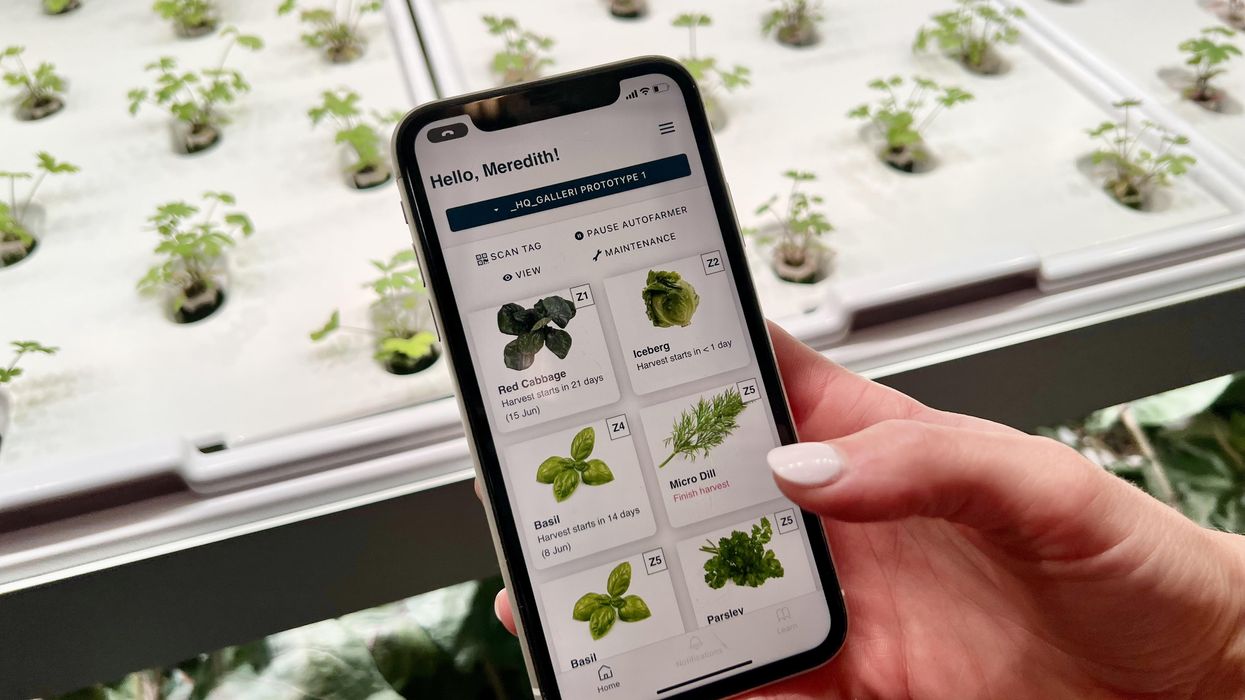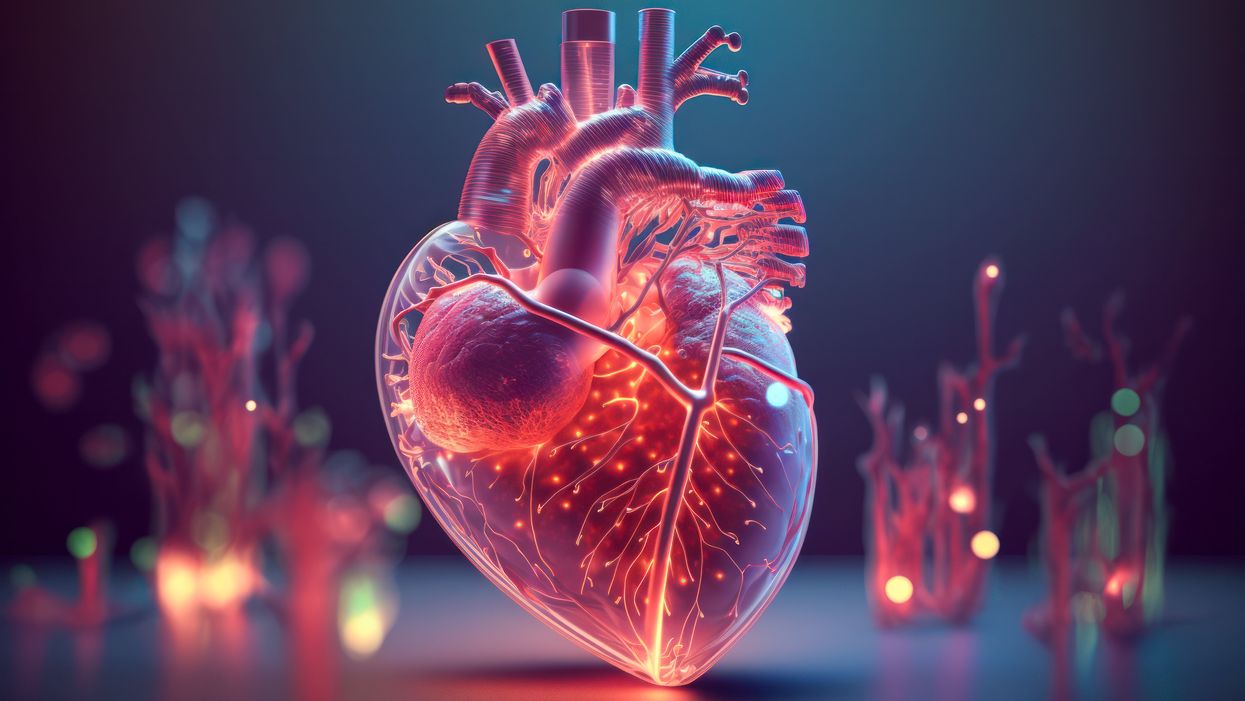Drugs That Could Slow Aging May Hold Promise for Protecting the Elderly from COVID-19
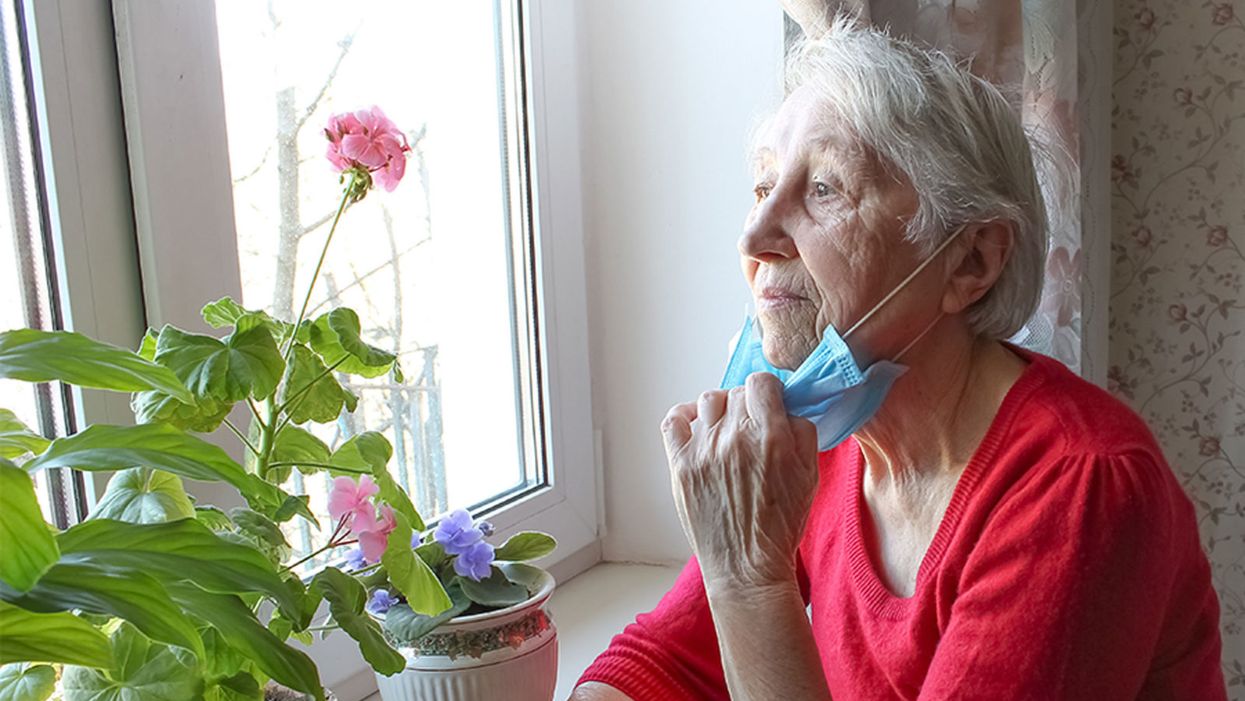
Two recent human studies indicated that rapalogues increased resistance to the flu and decreased the severity of respiratory tract infections in older adults.
Although recent data has shown the coronavirus poses a greater risk to young people than previously understood, the ensuing COVID-19 disease is clearly far more dangerous for older people than it is for the young.
If we want to lower the COVID-19 fatality rate, we must also make fortifying our most vulnerable hosts a central part of our approach.
While our older adults have accrued tremendous knowledge, wisdom, and perspective over the years, their bodies have over time become less able to fight off viruses and other insults. The shorthand name for this increased susceptibility is aging.
We may have different names for the diseases which disproportionately kill us -- cancer, heart disease, and dementia among them – but what is really killing us is age. The older we are, the greater the chance we'll die from one or another of these afflictions. Eliminate any one completely - including cancer - and we won't on average live that much longer. But if we slow aging on a cellular level, we can counter all of these diseases at once, including COVID-19.
Every army needs both offensive and defensive capabilities. In our war against COVID-19, our offense strategy is to fight the virus directly. But strengthening our defense requires making us all more resistant to its danger. That's why everyone needs to be eating well, exercising, and remaining socially connected. But if we want to lower the COVID-19 fatality rate, we must also make fortifying our most vulnerable hosts a central part of our approach. That's where our new fight against this disease and the emerging science of aging intersect.
Once the domain of charlatans and delusionists, the millennia-old fantasy of extending our healthy lifespans has over the past century become real. But while the big jump in longevity around the world over the past hundred years or so is mostly attributable to advances in sanitation, nutrition, basic healthcare, and worker safety, advances over the next hundred will come from our increasing ability to hack the biology of aging itself.
A few decades ago, scientists began recognizing that some laboratory animals on calorie-restricted diets tended to live healthier, longer lives. Through careful experiments derived from these types of insights, scientists began identifying specific genetic, epigenetic, and metabolic pathways that influence how we age. A range of studies have recently suggested that systemic knobs might metaphorically be turned to slow the cellular aging process, making us better able to fight off diseases and viral attacks.
Among the most promising of these systemic interventions is a drug called metformin, which targets many of the hallmarks of aging and extends health span and lifespan in animals. Metformin has been around since the Middle Ages and has been used in Europe for over 60 years to treat diabetes. This five-cent pill became the most prescribed drug in the world after being approved by the FDA in 1994.
With so many people taking it, ever larger studies began suggesting metformin's positive potential effects preventing diabetes, cardiovascular diseases, cancer, and dementia. In fact, elderly people on metformin for their diabetes have around a 20 percent lower mortality than age-matched subjects without diabetes. Results like these led scientists to hypothesize that metformin wasn't just impacting a few individual diseases but instead having a systemic impact on entire organisms.
Another class of drug that seems to slow the systemic process of aging in animal models and very preliminary human trials inhibits a nutrient-sensing cellular protein called mTOR. A new category of drugs called rapalogues has been shown to extend healthspan and lifespan in every type of non-human animal so far tested. Two recent human studies indicated that rapalogues increased resistance to the flu and decreased the severity of respiratory tract infections in older adults.
If COVID-19 is primarily a severe disease of aging, then countering aging should logically go a long way in countering the disease.
These promising early indications have inspired a recently launched long-term study exploring how metformin and rapalogues might delay the onset of multiple, age-related diseases and slow the biological process of aging in humans. Under normal circumstances, studies like this seeking to crack the biological code of aging would continue to proceed slowly and carefully over years, moving from animal experiments to cautious series of human trials. But with deaths rising by the day, particularly of older people, these are not times for half measures. Wartimes have always demanded new ways of doing important things at warp speeds.
If COVID-19 is primarily a severe disease of aging, then countering aging should logically go a long way in countering the disease. We need to find out. Fast.
Although it would be a mistake for older people to just begin taking drugs like these without any indication, pushing to massively speed up our process for assessing whether these types of interventions can help protect older people is suddenly critical.
To do this, we need U.S. government agencies like the Department of Health and Human Services' Biomedical Advanced Research and Development Authority (BARDA) to step up. BARDA currently only funds COVID-19 clinical trials of drugs that can be dosed once and provide 60 days of protection. Metformin and rapalogues are not considered for BARDA funding because they are dosed once daily. This makes no sense because a drug that provides 60 days of protection from the coronavirus after a single dose does not yet exist, while metformin and rapalogues have already passed extensive safety tests. Instead, BARDA should consider speeding up trials with currently available drugs that could help at least some of the elderly populations at risk.
Although the U.S. Food and Drug Administration and Centers for Disease Control are ramping up their approval processes and even then needs to prioritize efforts, they too must find a better balance between appropriate regulatory caution and the dire necessities of our current moment. Drugs like metformin and rapalogues that have shown preliminary efficacy ought to be fast-tracked for careful consideration.
One day we will develop a COVID-19 vaccine to help everyone. But that could be at least a year from now, if not more. Until we get there and even after we do, speeding up our process of fortifying our older populations mush be a central component of our wartime strategy.
And when the war is won and life goes back to a more normal state, we'll get the added side benefit of a few more months and ultimately years with our parents and grandparents.
Autonomous, indoor farming gives a boost to crops
Artificial Intelligence is already helping to grow some of the food we eat.
The glass-encased cabinet looks like a display meant to hold reasonably priced watches, or drugstore beauty creams shipped from France. But instead of this stagnant merchandise, each of its five shelves is overgrown with leaves — moss-soft pea sprouts, spikes of Lolla rosa lettuces, pale bok choy, dark kale, purple basil or red-veined sorrel or green wisps of dill. The glass structure isn’t a cabinet, but rather a “micro farm.”
The gadget is on display at the Richmond, Virginia headquarters of Babylon Micro-Farms, a company that aims to make indoor farming in the U.S. more accessible and sustainable. Babylon’s soilless hydroponic growing system, which feeds plants via nutrient-enriched water, allows chefs on cruise ships, cafeterias and elsewhere to provide home-grown produce to patrons, just seconds after it’s harvested. Currently, there are over 200 functioning systems, either sold or leased to customers, and more of them are on the way.
The chef-farmers choose from among 45 types of herb and leafy-greens seeds, plop them into grow trays, and a few weeks later they pick and serve. While success is predicated on at least a small amount of these humans’ care, the systems are autonomously surveilled round-the-clock from Babylon’s base of operations. And artificial intelligence is helping to run the show.
Babylon piloted the use of specialized cameras that take pictures in different spectrums to gather some less-obvious visual data about plants’ wellbeing and alert people if something seems off.
Imagine consistently perfect greens and tomatoes and strawberries, grown hyper-locally, using less water, without chemicals or environmental contaminants. This is the hefty promise of controlled environment agriculture (CEA) — basically, indoor farms that can be hydroponic, aeroponic (plant roots are suspended and fed through misting), or aquaponic (where fish play a role in fertilizing vegetables). But whether they grow 4,160 leafy-green servings per year, like one Babylon farm, or millions of servings, like some of the large, centralized facilities starting to supply supermarkets across the U.S., they seek to minimize failure as much as possible.
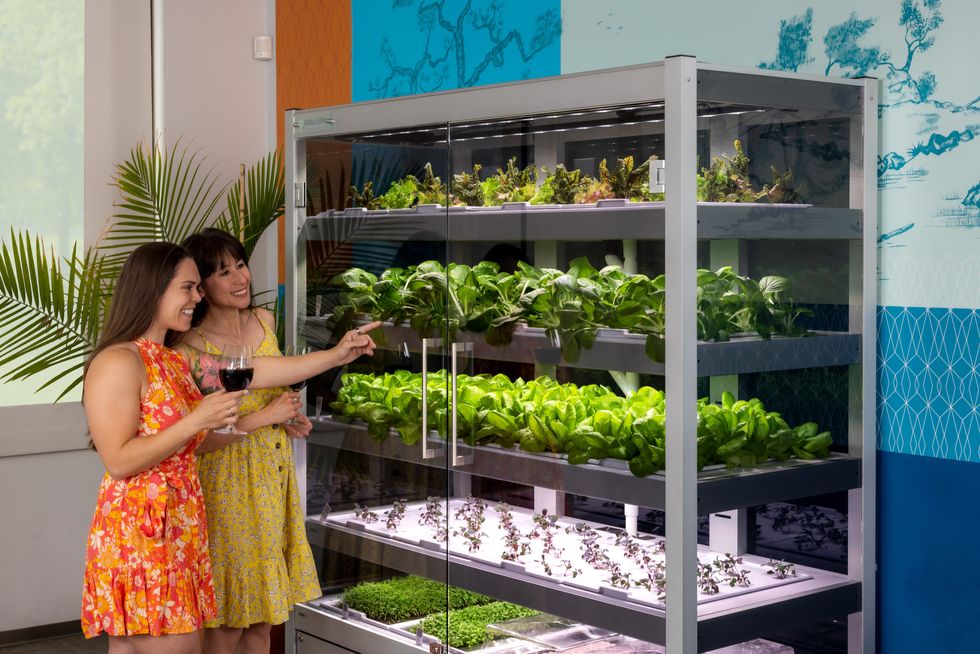
Babylon’s soilless hydroponic growing system
Courtesy Babylon Micro-Farms
Here, AI is starting to play a pivotal role. CEA growers use it to help “make sense of what’s happening” to the plants in their care, says Scott Lowman, vice president of applied research at the Institute for Advanced Learning and Research (IALR) in Virginia, a state that’s investing heavily in CEA companies. And although these companies say they’re not aiming for a future with zero human employees, AI is certainly poised to take a lot of human farming intervention out of the equation — for better and worse.
Most of these companies are compiling their own data sets to identify anything that might block the success of their systems. Babylon had already integrated sensor data into its farms to measure heat and humidity, the nutrient content of water, and the amount of light plants receive. Last year, they got a National Science Foundation grant that allowed them to pilot the use of specialized cameras that take pictures in different spectrums to gather some less-obvious visual data about plants’ wellbeing and alert people if something seems off. “Will this plant be healthy tomorrow? Are there things…that the human eye can't see that the plant starts expressing?” says Amandeep Ratte, the company’s head of data science. “If our system can say, Hey, this plant is unhealthy, we can reach out to [users] preemptively about what they’re doing wrong, or is there a disease at the farm?” Ratte says. The earlier the better, to avoid crop failures.
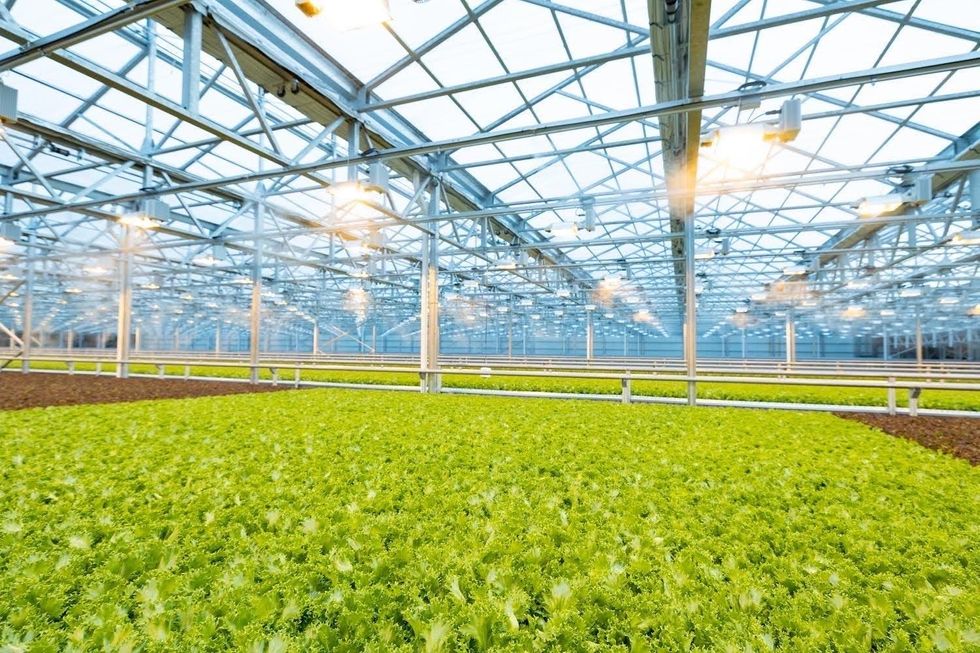
Natural light accounts for 70 percent of Greenswell Growers’ energy use on a sunny day.
Courtesy Greenswell Growers
IALR’s Lowman says that other CEA companies are developing their AI systems to account for the different crops they grow — lettuces come in all shapes and sizes, after all, and each has different growing needs than, for example, tomatoes. The ways they run their operations differs also. Babylon is unusual in its decentralized structure. But centralized growing systems with one main location have variabilities, too. AeroFarms, which recently declared bankruptcy but will continue to run its 140,000-square foot vertical operation in Danville, Virginia, is entirely enclosed and reliant on the intense violet glow of grow lights to produce microgreens.
Different companies have different data needs. What data is essential to AeroFarms isn’t quite the same as for Greenswell Growers located in Goochland County, Virginia. Raising four kinds of lettuce in a 77,000-square-foot automated hydroponic greenhouse, the vagaries of naturally available light, which accounts for 70 percent of Greenswell’s energy use on a sunny day, affect operations. Their tech needs to account for “outside weather impacts,” says president Carl Gupton. “What adjustments do we have to make inside of the greenhouse to offset what's going on outside environmentally, to give that plant optimal conditions? When it's 85 percent humidity outside, the system needs to do X, Y and Z to get the conditions that we want inside.”
AI will help identify diseases, as well as when a plant is thirsty or overly hydrated, when it needs more or less calcium, phosphorous, nitrogen.
Nevertheless, every CEA system has the same core needs — consistent yield of high quality crops to keep up year-round supply to customers. Additionally, “Everybody’s got the same set of problems,” Gupton says. Pests may come into a facility with seeds. A disease called pythium, one of the most common in CEA, can damage plant roots. “Then you have root disease pressures that can also come internally — a change in [growing] substrate can change the way the plant performs,” Gupton says.
AI will help identify diseases, as well as when a plant is thirsty or overly hydrated, when it needs more or less calcium, phosphorous, nitrogen. So, while companies amass their own hyper-specific data sets, Lowman foresees a time within the next decade “when there will be some type of [open-source] database that has the most common types of plant stress identified” that growers will be able to tap into. Such databases will “create a community and move the science forward,” says Lowman.
In fact, IALR is working on assembling images for just such a database now. On so-called “smart tables” inside an Institute lab, a team is growing greens and subjects them to various stressors. Then, they’re administering treatments while taking images of every plant every 15 minutes, says Lowman. Some experiments generate 80,000 images; the challenge lies in analyzing and annotating the vast trove of them, marking each one to reflect outcome—for example increasing the phosphate delivery and the plant’s response to it. Eventually, they’ll be fed into AI systems to help them learn.
For all the enthusiasm surrounding this technology, it’s not without downsides. Training just one AI system can emit over 250,000 pounds of carbon dioxide, according to MIT Technology Review. AI could also be used “to enhance environmental benefit for CEA and optimize [its] energy consumption,” says Rozita Dara, a computer science professor at the University of Guelph in Canada, specializing in AI and data governance, “but we first need to collect data to measure [it].”
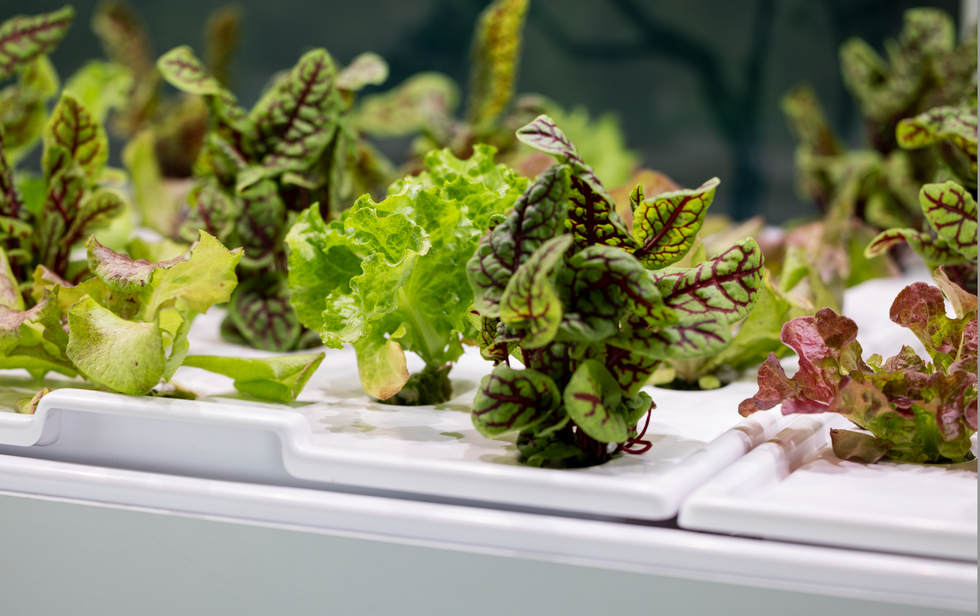
The chef-farmers can choose from 45 types of herb and leafy-greens seeds.
Courtesy Babylon Micro-Farms
Any system connected to the Internet of Things is also vulnerable to hacking; if CEA grows to the point where “there are many of these similar farms, and you're depending on feeding a population based on those, it would be quite scary,” Dara says. And there are privacy concerns, too, in systems where imaging is happening constantly. It’s partly for this reason, says Babylon’s Ratte, that the company’s in-farm cameras all “face down into the trays, so the only thing [visible] is pictures of plants.”
Tweaks to improve AI for CEA are happening all the time. Greenswell made its first harvest in 2022 and now has annual data points they can use to start making more intelligent choices about how to feed, water, and supply light to plants, says Gupton. Ratte says he’s confident Babylon’s system can already “get our customers reliable harvests. But in terms of how far we have to go, it's a different problem,” he says. For example, if AI could detect whether the farm is mostly empty—meaning the farm’s user hasn’t planted a new crop of greens—it can alert Babylon to check “what's going on with engagement with this user?” Ratte says. “Do they need more training? Did the main person responsible for the farm quit?”
Lowman says more automation is coming, offering greater ability for systems to identify problems and mitigate them on the spot. “We still have to develop datasets that are specific, so you can have a very clear control plan, [because] artificial intelligence is only as smart as what we tell it, and in plant science, there's so much variation,” he says. He believes AI’s next level will be “looking at those first early days of plant growth: when the seed germinates, how fast it germinates, what it looks like when it germinates.” Imaging all that and pairing it with AI, “can be a really powerful tool, for sure.”
Scientists make progress with growing organs for transplants
Researchers from the University of Cambridge have laid the foundations for growing synthetic embryos that could develop a beating heart, gut and brain.
Story by Big Think
For over a century, scientists have dreamed of growing human organs sans humans. This technology could put an end to the scarcity of organs for transplants. But that’s just the tip of the iceberg. The capability to grow fully functional organs would revolutionize research. For example, scientists could observe mysterious biological processes, such as how human cells and organs develop a disease and respond (or fail to respond) to medication without involving human subjects.
Recently, a team of researchers from the University of Cambridge has laid the foundations not just for growing functional organs but functional synthetic embryos capable of developing a beating heart, gut, and brain. Their report was published in Nature.
The organoid revolution
In 1981, scientists discovered how to keep stem cells alive. This was a significant breakthrough, as stem cells have notoriously rigorous demands. Nevertheless, stem cells remained a relatively niche research area, mainly because scientists didn’t know how to convince the cells to turn into other cells.
Then, in 1987, scientists embedded isolated stem cells in a gelatinous protein mixture called Matrigel, which simulated the three-dimensional environment of animal tissue. The cells thrived, but they also did something remarkable: they created breast tissue capable of producing milk proteins. This was the first organoid — a clump of cells that behave and function like a real organ. The organoid revolution had begun, and it all started with a boob in Jello.
For the next 20 years, it was rare to find a scientist who identified as an “organoid researcher,” but there were many “stem cell researchers” who wanted to figure out how to turn stem cells into other cells. Eventually, they discovered the signals (called growth factors) that stem cells require to differentiate into other types of cells.
For a human embryo (and its organs) to develop successfully, there needs to be a “dialogue” between these three types of stem cells.
By the end of the 2000s, researchers began combining stem cells, Matrigel, and the newly characterized growth factors to create dozens of organoids, from liver organoids capable of producing the bile salts necessary for digesting fat to brain organoids with components that resemble eyes, the spinal cord, and arguably, the beginnings of sentience.
Synthetic embryos
Organoids possess an intrinsic flaw: they are organ-like. They share some characteristics with real organs, making them powerful tools for research. However, no one has found a way to create an organoid with all the characteristics and functions of a real organ. But Magdalena Żernicka-Goetz, a developmental biologist, might have set the foundation for that discovery.
Żernicka-Goetz hypothesized that organoids fail to develop into fully functional organs because organs develop as a collective. Organoid research often uses embryonic stem cells, which are the cells from which the developing organism is created. However, there are two other types of stem cells in an early embryo: stem cells that become the placenta and those that become the yolk sac (where the embryo grows and gets its nutrients in early development). For a human embryo (and its organs) to develop successfully, there needs to be a “dialogue” between these three types of stem cells. In other words, Żernicka-Goetz suspected the best way to grow a functional organoid was to produce a synthetic embryoid.
As described in the aforementioned Nature paper, Żernicka-Goetz and her team mimicked the embryonic environment by mixing these three types of stem cells from mice. Amazingly, the stem cells self-organized into structures and progressed through the successive developmental stages until they had beating hearts and the foundations of the brain.
“Our mouse embryo model not only develops a brain, but also a beating heart [and] all the components that go on to make up the body,” said Żernicka-Goetz. “It’s just unbelievable that we’ve got this far. This has been the dream of our community for years and major focus of our work for a decade and finally we’ve done it.”
If the methods developed by Żernicka-Goetz’s team are successful with human stem cells, scientists someday could use them to guide the development of synthetic organs for patients awaiting transplants. It also opens the door to studying how embryos develop during pregnancy.
This article originally appeared on Big Think, home of the brightest minds and biggest ideas of all time.

